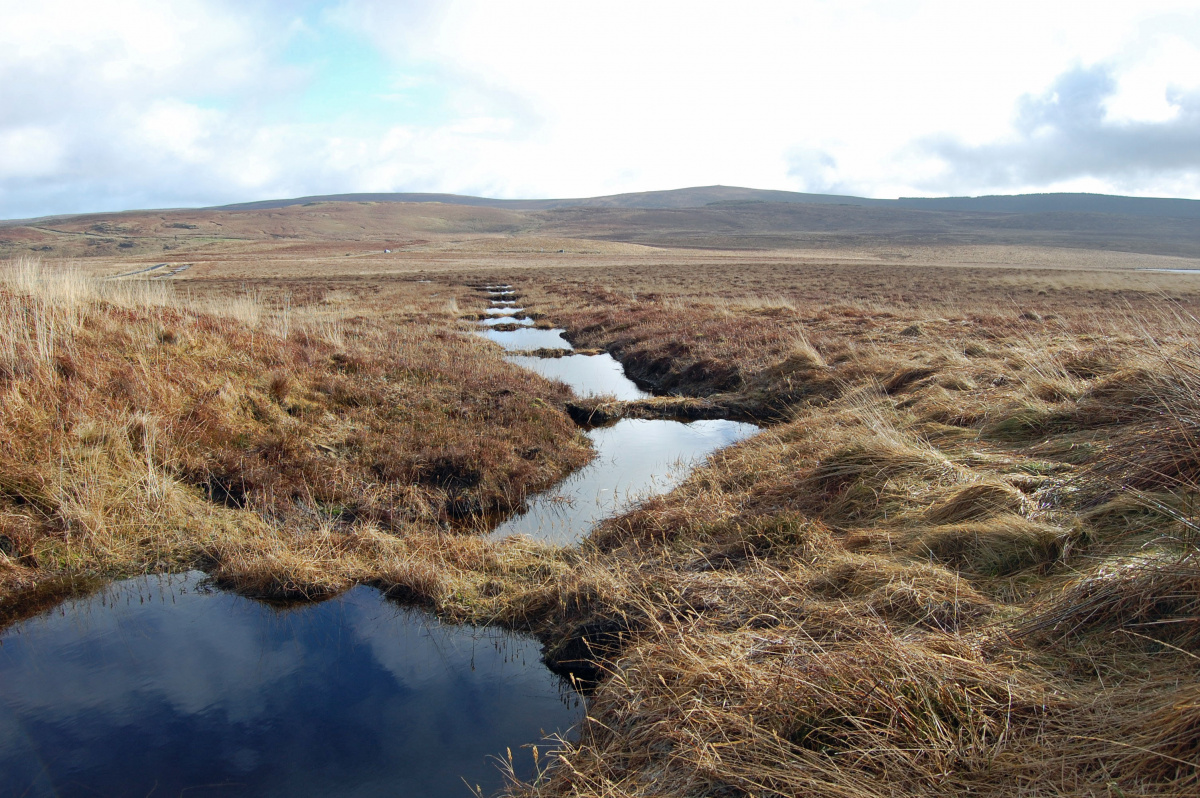Preparing for a green recovery with Jonathan Bell
 Jonathan Bell, Head of Land and Sea Policy at RSPB NI, reflects on what life during lockdown meant for nature and climate recovery, and why now is the perfect opportunity to align climate, nature and economic recovery strategies.
Jonathan Bell, Head of Land and Sea Policy at RSPB NI, reflects on what life during lockdown meant for nature and climate recovery, and why now is the perfect opportunity to align climate, nature and economic recovery strategies.
What impact has the pandemic had on nature and people's attitudes towards the natural world?
According to polling, people in Northern Ireland have felt more connected to nature since the start of the pandemic. Three out of four people have appreciated access to local green spaces since lockdown restrictions began and 74% of respondents agree there should be new laws to better protect nature. This shows that we really need to be prioritising a nature-rich green recovery as we rebuild society after the pandemic. This is why as part of our Revive Our World campaign, we are asking the public to join us to push for legally binding targets to restore nature by 2030.
Right now, no real monetary value is assigned to the benefits nature provides society. Do you think that should change?
Environmentalists are often divided around the merits of putting a monetary value on nature. On the one hand, some feel it reinforces the status quo in terms of the power the economy has over the environment. On the other hand, we have to be pragmatic and work within the system that we have, and by demonstrating the financial value of our environment, it may lead to better investment and policy decisions that take into account the true value of nature to society.
To really embed natural capital thinking within government, the first step is to develop a Natural Capital register which would identify and value all of our existing natural assets. This would help us measure change and provide a baseline for decision making. The natural environment is our most precious asset and it should be viewed in a similar way to built infrastructure assets, in that it requires maintenance, repair and protection.
Has any work been done to align health and environmental strategies in Northern Ireland yet, given the synergies that exists there?
Low levels of spending on environmental protection in Northern Ireland suggests that government is failing to grasp the link between environmental conditions (things like air quality, diet and exercise) and social outcomes (like health and happiness). Greater levels of public investment are needed to enhance the provision of, and access to, nature rich green space given the considerable health benefits at stake.
Green prescriptions are an area of untapped potential in Northern Ireland. For example, the Head to Nature pilot project led by RSPB NI in partnership with Derriaghy Social and Educational Centre linked patients suffering from mental health problems up with nature-related activities such as guided walks, wildlife photography and practical conservation work on a local reserve for 12-weeks. At the end of the study, participants reported improvements in their mental health and confidence.
I hope the forthcoming Northern Ireland Mental Health Strategy commits to using nature to prevent and treat mental health issues. This would provide the policy framework for an integrated approach to green prescriptions across Northern Ireland.
There is much talk about the importance of a 'just transition'. What does this mean, in practice?
The transformation required to tackle the climate and nature emergency is an opportunity to tackle existing inequalities, strengthen communities and improve wellbeing. A just transition ensures that no community feels left behind and that no-one is disadvantaged by the move to a greener society.
As part of our Revive our World campaign, we have been calling for a green recovery to ensure that the investment required to deal with the economic and societal challenges posed by the pandemic, also helps tackle the nature and climate emergency in a fair and just way.
What do you think is the main role of government and local councils in supporting a just transition?
Government generally has a critical role in setting the legislative and policy context and channelling public spending and investment in a way that is conducive to tackling the climate and nature emergency. Government can be the catalyst for driving transformation in key areas, such as land management, transport, energy and nature protection. The planning system has a critical role to play in this, by facilitating carbon neutral and climate resilient development that also benefits nature.
Local councils and the wider public sector can also lead by example, delivering nature-based projects on their own land. Local authorities can make really simple changes like planting the right trees in the right place, cutting grass verges less frequently and creating more wildflower strips in public parks. The resource for grass cutting could then be re-deployed to deal with other challenges.
There has been much speculation about a forthcoming Climate Change Act for Northern Ireland. How do you see nature recovery being integrated into climate plans?
RSPB NI has been advocating for an ambitious Climate Change Act to help reach net zero and I was thrilled to see the first ever Climate Bill reach the Assembly floor last month. A Climate Change Act can be a primer for a green recovery in Northern Ireland. We are facing both a nature and climate emergency, and at RSPB we believe nature is the first line of defence in the fight against climate change, given the potential for natural habitats to sequester carbon and enhance resilience to the impacts of climate change. Therefore, we would like to see the Climate Bill support nature-based solutions, by providing the legislative basis for nature-based programmes and policies to be progressed through Climate Plans.
Do you think ‘Green Growth’ is the right approach for Northern Ireland to take in tackling climate change?
Green growth means different things to different people and a blinkered growth agenda could actually have adverse effects on the environment. An ‘economy at all costs’ approach will be a false economy in the long-run and if we continue to erode our natural resources at the current rate, we will undermine future prosperity and well-being. Green growth needs to genuinely be about protecting, restoring and better managing our environment to deliver positive outcomes for people and the planet. Integration across government is essential to ensure there is alignment between government Departments and that they aren’t pulling in different directions.

Above: Peat dams at Dungonnell reservoir. Photo credit: Chris Thompson
There has been a dash to plant trees recently in an effort to offset carbon emissions. Why are we seeing so many conifer species being planted across our countryside, and is this the optimum solution?
Tree planting is one of a number of nature-based solutions to climate change as they store carbon and can also help alleviate flooding, but we need to be pursuing a policy of ‘the right tree in the right place’. We have seen many tree planting schemes focus on conifers that are fast-growing but provide limited benefits for nature.
Unfortunately, many conifers have also been planted on peatlands which is disastrous for biodiversity and carbon storage. Northern Ireland requires major investment for open habitat restoration to remove trees from deep peat. NI Water recently restored 30 hectares of afforested bog at Tullychurry Forest, adjacent to Petigoe Plateau. This sort of project should be scaled up.
We think the optimum solution is to increase planting of native, broadleaved, deciduous trees on non-peat soils in conjunction with restoring and expanding other key habitats for carbon storage. If we get this right there will be a multitude of social, economic and ecological benefits.
If you were Environment Minister and you could change one policy, what would it be?
I would establish an independent Environmental Protection Agency. Environmental governance in Northern Ireland is extremely weak. Northern Ireland is the only part of the UK that does not have a separate and independent statutory nature conservation body. Unacceptable levels of disregard and non-compliance of environmental law have resulted in extensive degradation of our environment, at significant social and economic costs.
I would also launch a Green New Deal with a specific Green Jobs Scheme to provide job opportunities for young people and the recently unemployed to take a hands-on role in tackling the nature and climate emergency.
Above: RSPB NI team day with PWC at Belfast Harbour Meadows. Photo credit: Chris Thompson
What do you hope will have been achieved in Northern Ireland, 5 years after the coronavirus crisis?
Good question! I’d like to think by then we’ll have ambitious climate legislation in place supported by a Northern Ireland Climate Plan setting us on course to deliver net zero by 2045, in harmony with nature. There will be legally binding nature recovery targets and a legal duty on the NI Assembly and all public bodies to meet these targets.
A re-purposed agricultural policy will hopefully be rewarding farmers for environmental public goods, such as biodiversity enhancement, improving water, air and soil quality and delivering a stable climate, as well as resilience to flooding.
In the marine environment, the Marine Protected Areas network will be complete and effective management plans will be in place for all protected sites. Alongside this, there will be a newly launched Northern Ireland Seabird Conservation Strategy.
There’ll be independent Environmental Protection Agency alongside the Office for Environmental Protection – a new UK-wide Government watchdog – in Northern Ireland. While the OEP will be focused on how the NI Executive and public authorities are adhering to environmental laws, an independent EPA will provide independent oversight of businesses and individuals.
Overall, I think the environmental legacy of the pandemic will be a generation of people who are more engaged and interested in the natural world and more prepared to speak up for nature. Because of the surge in demand for nature rich green space, there will hopefully be new parks, greenways, blueways, trails and nature networks.
Jonathan Bell is the Head of Land and Sea Policy at the RSPB where he leads policy work in a range of areas, including food and farming, peatlands, forestry, climate, natural capital and marine. In his spare time, Jonny is an international hockey player and was part of the first Irish hockey team to compete at an Olympic Games in Rio de Janeiro in 2016.
Contact: jonathan.bell@rspb.org.uk
For more information or to support RSPB NI’s work, visit www.rspb.org.uk/ReviveOurWorld

